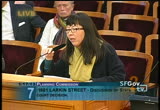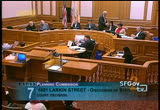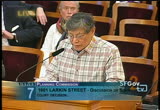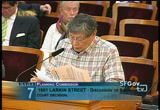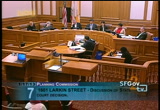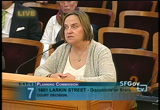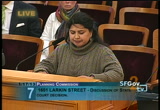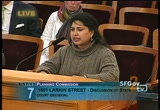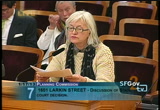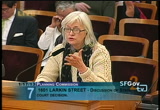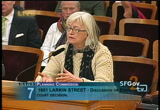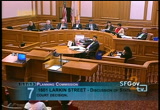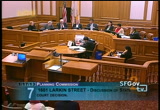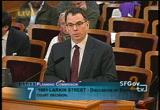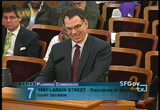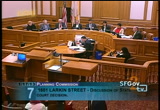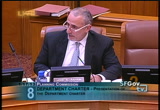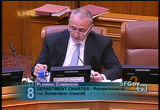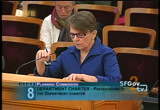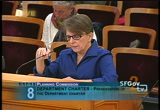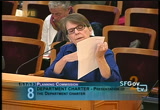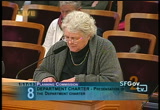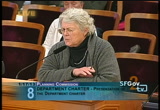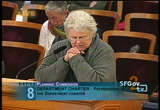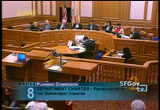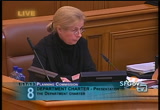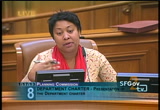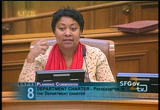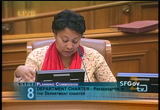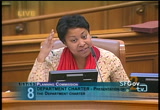tv [untitled] January 17, 2013 1:00pm-1:30pm PST
1:00 pm
before the june 28th hearing to -- sorry. is that my time, 30 seconds? >> 30 seconds. >> i'll say very quickly that behavior by this developer and sponsors was very threatening to the neighbors. the two adjacent neighbors at 1630, liz gordon had seven windows removed voluntarily to accommodate this project. and now she's having trouble getting him to, you know, put setbacks and to do the lighting correctly. 1625 still complains that they were proposing to put up a green thank you. >> good afternoon, commissioners. my name is heroshi chair of the
1:01 pm
coalition for san francisco neighborhoods land use committee. i will start off by saying this past tuesday night the coalition took a vote and -- on this resolution, resolve -- supports the -- reuse of the first st. john's united methodist church for senior housing or another preservation alternative. we urge department of building -- or supervisors, city attorney, district attorney to pursue action for building code and ceqa violations. so in that regard, we will be submitting a letter to the city attorney. it's in part it reets, dear city attorney -- san francisco neighborhoods request the city of san francisco for ceqa violations as well as the vacant building ordinance for 1601 larkin street. goes on, the planninggv 8, commission, twice rejek plans
1:02 pm
for replacement and'jpt; directd owner toájj!tv secure and mainte building. dbi documented code violations or other illegal activity. we expect city attorney to planning department files, history of cads and 311 reports and detail accountsm=nnñ available from neighbors while looking at enforcement for this project through a long delay ultimately the responsibility of the city of san francisco city attorney to protect neighborhoods, uphold laws intended for secure community, and assist operations of city agencies such as our police, planning department, and department of building inspections. we would appreciate your follow-up on the history of violations as well as enforcement of our state and city laws at 1601 larkin street. your swift action is urgently
1:03 pm
needed. thank you for your diligence in supporting the community. yours truly judy berkowitz coalition for san francisco neighborhoods. also attached to the handout are two pages of e-mail from -- butler, and details some of the violations. so thank you for your consideration and i hope that the cu for this project will not be allowed to expire or get a new cu be allowed to be heard before the one year period as required by the city code. thank you. >> president fong: thank you. any additional public comment? >> hello. dawn trenner.
1:04 pm
good afternoon, president fong, congratulations and commissioners. i'm kind of surprised to be here today. i didn't really have this on my schedule for too long, didn't know that this was going to be a talking point for today. but i just wanted to let you know that the -- association continues to work very hard on this, very important and very difficult project in our neighborhood. we have been and we continue to reach out to the neighbors to understand what it is that the neighbors, and our members want, and that is what we will -- the information will gather and present to you at the time we're told to present it to you. and i know that that's very controversial. we've addressed this the last time we were here. we were very surprised, have the time shortened as well. but if that's what it is, i guess that's what it is. but we'll follow directions and gather neighborhood preferences, and bring that to you, and
1:05 pm
present it as such. and we are having a middle poke meeting this monday night where this will be one of the main topics and that meeting is open to all to attend, and ask questions, and get more information, and again that would be on the particular project that is being presented, which is the only one that i know of right now. thank you. >> president fong: thank you. any additional public comment on this item? >> my name is natasha, former first st. john's united methodist member at that location. i've never spoken at one of these before so i'm sorry if this is not actually relevant. i was administrative council chair at the time when our church was closed by our annual conference. and we made several recommendations for the property and all of them were something
1:06 pm
to be community based for the needs or the mission of the community, or the neighborhood. our annual conference deemed that we would not be able to take care of it ourselves, with the complexity of the problems with the building and the size of our congregation compared to the size of the building. and so we merged with another congregation on 7th avenue, park presidio. basically, wanted to reiterate that our -- as a congregation, our desire was for something for the community. and we really had no idea that something as appalling as a possible developer that might come in would disrespect the property in the manners that we've heard and seen. i'm also a neighbor, not -- and -- nobody nob hill, not
1:07 pm
within the same block. of course have concern for the historical property of the -- it being -- not just our congregation, is a very historical congregation, always the building, the architecture, i mean things even coming down to the pipe organ that had been transported by boat in several transports, you know, it's very -- a lot of historical -- history. anyway, that's all i had to say. thank you. >> linda chapman for nob hill neighbors. i brought a partial list of people who are supporting partial preservation for senior housing or alternatively senior housing in the event it should prove improve to preserve after what the developer has done in his effort to destroy it. so may i give you these. you know, we certainly cannot
1:08 pm
succeed, to take a treasured landmark, which was in good condition, and no harder to preserve than any other church. other churches are not being demolished in the city. and then to wreck it as much as possible so that in his response about what we're going to do for community benefits, he says there are no artifacts left. they have all been vandalized, or they have all been stolen. now who did the department of building inspection find stealing the hard wood floors? right? the project sponsor. and then the lawyer said that the reason they can't preserve the church properly, you know, with lights and alarms and so on, as commissioner antonini directed, acting like the 6th army commanders cutting to the chase when i worked for them, do entire electrical system was
1:09 pm
stolen. where you could draw an inference. you know, who goes around systems for churches for the the fun of it and the windows and so on. although they're not stealing windows from the other churches that are empty at night, and during the week, even if they're not permanently empty. so this is a problem. now you've just received a court decision that said you have discretion to turn things down because it's just a matter of the developer saying this is what we want. but wheni+tgájy the community sd i hope we won't have to do now as we did at 1300 sacramento, i hope we won't go down that route, we would be suing the methodist church and the city, it's because of not following ceqa, or the planning code or the law. up to now you have done so. i am concerne concerned about af discretion. a decision was made. it was a different project. and that was done before architectural drawings were submitted -- were even drawn. they weren't drawn yet. have all the documentation.
1:10 pm
before planning -- before an application was submitted, before a project description, according to the cord pondance that we've seen, how do you make a decision that this is a different project. and, you know, street chamber again, you know, is very concerned. you can't get in here today but very concerned about giving discretion that belongs to the planning commission and staff to a few individuals and letting them negotiate, this isn't the way we did it before. we would meet with the director to negotiate and maybe the director would negotiate or maybe -- you know. and in the past you didn't have the kinds of tools you have now, like demolition controls. when they actually approved some of these things and vacant building ordinances. >> president fong: is there any additional public comment? seeing none, next item please. >> commissioners, that will place you under item -- >> i'm very sorry. commissioner sugaya. >> commissioner sugaya: i
1:11 pm
received by e-mail this decision back in december from a land use attorney friend of mine. and thought it was important to have the commission have an informational session on the court decision itself. and we, i think through the chair, debated whether it needed to be a closed session or not a closed session. and i think the city attorney's office decided that just reporting on what the court had ruled on didn't need to be a closed session. so i'm happy to we had this, and that we're proceeding i guess well, at this point. >> president fong: commissioner antonini. >> commissioner antonini: just a follow up, the nature of today's discussion is specifically about the state court decision, and the rest of the project is not necessarily -- is not before us today. but i did want to just ask the
1:12 pm
city attorney that there still is a federal action outstanding. is that correct? >> city attorney: commissioner antonini and president fong and commissioners, yes. pursuant to an agreement and a court order in the federal case, the city filed what's called a motion for judgment on the pleadings or a motion to dismiss on december 21, actually the same day that we got the state court opinion. so we are moving to dismiss that case. we expect the opposition, both from the project sponsor and the property owner tomorrow and our reply brief is due on february 1, and our hearing is scheduled for tuesday, february 12, 2:00 in federal court in oakland.
1:13 pm
>> thank you. these are entirely issues that are legal issues that are apart from our actions here, this part of city agencies, and therefore there is no reason we can't continue with the approval or whatever action we may take of any subsequent project at this site. >> city attorney: the litigation that i -- what the court -- what the california court of appeal decided in december 2012, and what the federal court will decide some time either on the 19th of february or shortly after, are the proprietary of the decisions in 2010. so not -- neither the state court or the federal court cases
1:14 pm
proposed project that might be coming in front of the commission in the future. >> commissioner antonini: right. so those are on past actions that occurred in 2012 but there is no litigation involving any of the actions in mid-2010, mid-2012 is not under these actions or any of the actions we're working on now. >> city attorney: right. i'll remind the commission that they -- that there was a certification of an eir in 2012. >> commissioner antonini: thank you. >> president fong: commissioners, that will place you on item 8, department charter. >> good afternoon, commissioners. excuse my voice. i'm a little cold here. so before you on this item is a
1:15 pm
simple charter statement that the department has been working on for several months. the idea of this charter is to act -- is to encompass a vision statement, a mission statement and a value statement for the activities of the department. it's meant to be a primarily a internal document that the staff uses to guide our work, and to kind of test our effectiveness. if you recall, when you -- when we heard the -- when you heard the presentation from the staff on the public outreach and engagement plan last year you had several concerns about that and asked for kind of a broadening of that effort. and this is something that we had been wanting to do for a while, that i had been wanting to work on, and your concerns about the public outreach get this done and move it forward. so the idea here is to have a fairly short, fairly direct document, and i will say that this started out as a three or
1:16 pm
four page document and actually takes some work to make it short and sweet but that's the idea to make a document that staff can use as a guide to put on our desks, put in our cubicles and really help us guide our work and understand the mission of the department, how the commission guides are work, and the values that we do our work. it has three simple components, a vision statement, a mission statement and a series of value statements for what we do and how we do it. the intent is that it be short and sweet and kind of a useful guide, something to stick our wallet, or on the wall of our cubicle to guide our work. so we are asking you to consider adopting this as the authority that actually guides -- that actually directs the work of the department. and to sort of emphasize the importance of these values in our work every day. thank you. >> president fong: i'm going to first open this up to public comment. judith berkowitz.
1:17 pm
>> good afternoon, commissioners. judith berkowitz speaking solely for myself on this matter, and not for any organization. when i first opened this document and read it, even though i was by myself, i was so embarrassed, i blushed. it was -- in the dictionary, the merriam webster world dictionary and abridged oxford this does not meet the definition for charter in any way whatsoever. there is no reference to existing policies, plans, process or procedures. the -- it opposes no challenges, no real challenges. it -- there's no way to -- no language to address short
1:18 pm
comings. before these statements are made. the word clouds, while pretty, have no real basis. and i question their usefulness on posters and wallet cards. these actually were studied, and in the 1980's, when lillian vernon and the sky mall made them available for posting in businesses. and the studies found them to be absolutely useless. so i would urge the department not to waste any of their revenues, which thank you, i'm glad the revenues were way up, but please don't waste it on posters and wallet cards. i would urge the commission to,
1:19 pm
once again, send this back for further work. it certainly, in my estimation, needs it. i don't know who worked on it. according to the language in the personal letter, which isn't part of the document, i wouldn't think, you had some input. i advise you to please give more input and address real honest to goodness shortcomings within the department and how those are going to be alleviated. on a single -- in the word clouds, one thing stands out, and that's deliberate. we are deliberate in our process, and stand by our decisions, even when others disagree. i would think that when others disagree, for instance the city
1:20 pm
attorney, or any other kind of knowledgable body, that it would be in the best interest of the department to change opinion. thank you so much. >> president fong: thank you. is there any additional public comment? on this item. >> sue hestor, speaking for myself. when i saw the term charter on the agenda, i thought you were talking about the san francisco charter. which guides all of us, and is a governing document. i think that name is confusing. secondarily, i'm struggling with the records of the city and the records of the planning department. and when i look at what is here,
1:21 pm
there is no acknowledgement that this plan use department is a part of the city. because what we do as a city is we actually pass laws that deal with public records. and on the ballot in 1999 was proposition "g". also known as the sunshine ordinance. and it requires an openness on public records, an open attitude that should be reflected in this document, because it is city policy. if we are not dealing with planning policy, we don't deal ballot in 19 -- was adopted by the voters and set planning department policy in 1986. so i'm looking for the policies.
1:22 pm
every time we go to the ballot, the people of the city adopt policies that, on -- not every time. we adopt policies on a regular basis that are supposed to guide the planning department. and the overwhelming policy is an openness of public records, and the records are supposed to be accessible. 1993. we have housing policies for affordable housing. the prejudice is towards affordable housing in the city, by law. and so if it the planning department puts a document like this together, that doesn't really say they're a part of the city government, and they're a part of the city populous, because our people make the policy. that's what a charter city does.
1:23 pm
we're not a general -- city. we are a charter city. the people make the policy. the board of supervisors adopts policy.hg the planning department is down the line. you are not over the people of san francisco, and our policies is the records should be open, and where is it. where is it. it should beakheq number one ons list. here's prop "m" and 101.1 of the planning code, it's the policy for reconciling all other policies. and it's part of the planning code. thank you. >> president fong: thank you. is did any additional public comment? seeing none, the public comment portion is closed. commissioner moore. >> commissioner moore: it's difficult to get into this discussion without expressing appreciation for the effort, but i do think that many of the comments made by the public,
1:24 pm
somewhat reflect my own concerns. most and foremost i believe the words of planning department charter has to be changed. san francisco is the only city in california, is the only city and county which is a chartered city. just very unusual. in california that is i think -- legal reference. for this i think is an ideal statement, a manifesto of creed or of basic values in its application and presented to the public and the commission -- personally generic. and while i agree with many of the values expressed of how we conduct ourselves personally and professionally with respect to trust and consistency and those things there need to be
1:25 pm
references to what informs us in our actions relative to those values. and i would agree with ms. hestor with public records policies, the chartbo) r÷ itsel, charter amendments, the rules, and plan regulations that govern planning need to be referenced as a daily part of reference of how you are respectful, trusting, deliberate, consistent, et cetera. and i would be asking that they would be incorporated by inference in addition to changing -- moving away from the word of charter. >> president fong: commissioner borden. >> commissioner borden: i think the major mistake was they called it a charter and what you wanted to say was department core values or mission. i work for a large corporation. our core values are dedication to every client success, and -- that matters for our company and the world, and trust and personal responsibility in all
1:26 pm
relationships. doesn't say we're a technology services company, it doesn't say we sell things. my point is that those values are how we operationallize the business that we do. i think the attempt of the department was to -- operationallize the business you do. it's more about culture not about actual tactics. we have a hard time having these discussions because yes, there was misuse of the word charter. maybe core value would have been a better use of the word and i understand why people glommeddfx onto that but i think there is a youthful aspect of deciding the culture of what you want to be in the organization, and how you -- when you operationallize implementing public record or, you know, reacting to sunshine requests, that you have these values that in mind of how you do that. the truth is, you know, companies, organizations, spend, in some cases, millions of dollars to arrive at what those
1:27 pm
values are, and clearly, you know, we did not do that. i commend the department for what has been done and how they've tried to be inclusive in creating these, recognizingnó( t major corporations and even government spend money and countless hours and workshops coming up with what i just said three:a% sentences, 400,000 plus company. so i recognize that's difference there. i mean i think that for the most part, there's a lot of good stuff here, and i actually would -- you know what i think would probably be useful is to add to some of the values that we have here, we have division and then the mission. i thought for example having something that said a little more about we work to be inclusive, striving to reach underserved communities having linguistically sensitive outreach, i think under one of our values that could be a bullet point added that would
1:28 pm
add a lot i think in that regard. i have to say that there is a lot of -- there's a lot of different disputes in the past but there's organizational experts actually say there's a great degree of value in having posted values, and culture. i mean i know in the corporate environment, if you -- motivational speakers, even yesterday i was listening to an alternative high school and their core values really -- of inquiry, and exploration, and all that sort of stuff really embodied how they taught their students and their students performed and achieved. so these words do mean something. and so i do think it's important to have them and to make them present, because if you have them present, then you can point to them when you're not living up to them. but, you know, probably, yeah, it could -- could more work be done, we administer words or
1:29 pm
tack away more words i'm sure we could. the value is in the exercise and rallying around the things that matter. and if we probably have a much more fruitful conversation looking at some of the bullet points under the values that we've outlined and adding to those, and then maybe separate in another conversation, talk about, you know, tactics, which is around proposition "m" or whatever. and that's probably part of a larger general plan discussion which i think we're going to get to when we talk about budget because i know there's some work -- you know some plans to do work underway for changing our general plan or updating the general plan. that's where some of those things might be added. >> president fong: commissioner antonini. >> commissioner antonini: i think it's actually very well done in general. i would agree with those who would say maybe instead
79 Views
IN COLLECTIONS
SFGTV2: San Francisco Government Television Television Archive
Television Archive  Television Archive News Search Service
Television Archive News Search Service 
Uploaded by TV Archive on

 Live Music Archive
Live Music Archive Librivox Free Audio
Librivox Free Audio Metropolitan Museum
Metropolitan Museum Cleveland Museum of Art
Cleveland Museum of Art Internet Arcade
Internet Arcade Console Living Room
Console Living Room Books to Borrow
Books to Borrow Open Library
Open Library TV News
TV News Understanding 9/11
Understanding 9/11